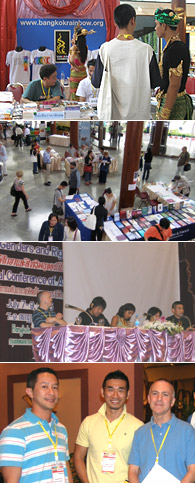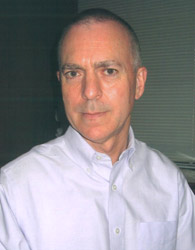Some 550 scholars, NGO workers, gay activists and film-makers involved in researching and documenting Asian lesbian, gay, bisexual, transgender, transsexual, bisexual and queer (LGBTQ) cultures gathered in Bangkok from July 7 to 9 for the first ever event of its kind.

Held at the Ambassador Hotel in Bangkok, the event attracted some 550 delegates from 22 countries. Last pic (left to right): Jim Chow and Stuart Koe of Fridae.com with co-organiser Associate Professor Peter Jackson of the Australian National University.
Activists from the region including China's Hui Jiang (Gaychinese.net), Hong Kong's Roddy Shaw (Tongzhi Community Joint Meeting), Chung To (Chi Heng Foundation) and Connie Chan (Women's Coalition), Indonesia's Dede Oetomo (Gaya Nusantara) and Singapore's Alex Au and Russell Heng (both of People like Us).
The organisers, the Office of Human Rights Studies and Social Development at Mahidol University and Australian-based AsiaPacificQueer Network, had originally expected between 50 and 100 delegates, but eventually managed to accommodate some 165 papers to be presented in seven simultaneous streams.
The separate Thai-language stream held concurrently and attended by local and Thai-speaking foreign scholars, community groups and activists from the provinces as far as Chiang Mai also marks the first time a national level queer studies conference has been held.
"Queer" is used to refer to the full diversity of homoerotic, transgendered and trans-sexual behaviours, identities and cultures as well as a term which argues that studying homosexual histories and cultures does not tell us about so-called "minorities" but rather reveals central facts about the heterosexually dominated world.
Conference co-organiser Associate Professor Peter Jackson of the Australian National University in Canberra said, "This conference is about supporting the growing international momentum for homosexual rights."
In his speech at the opening ceremony last Thursday, he highlighted that while Asia's queer communities are at the forefront of the region's drive towards developed status, they remain second-class citizens in every Asian country.

Co-organiser Associate Professor Peter Jackson of the Australian National University.
Professor Vithit Muntarbhorn, Recipient of the Unesco Human Rights Education Award and Professor of Law at Thailand's prestigious Chulalongkorn University, echoed Jackson's speech.
Referring to Reading Jail where the famous Irish playwright Oscar Wilde was imprisoned for "gross indecency" in 1895, Vithit said at the opening session that he regretted that "Reading Jail is still with us today, and there are many Oscars."
Organisers also highlighted another goal of the conference that is to support and defend the academic legitimacy of research and teaching about LGBTQ peoples in Asia.
"Many Asian universities are extremely conservative institutions. While many younger scholars want to research this region's queer communities, they are often stymied by anti-gay professors who refuse to permit research into these topics," said Jackson. The Thai-speaking professor, who is noted among Asian scholars for his gay studies, is also the author of several books on gay culture in Thailand.
He notices that academics who study gay, lesbian and transgendered cultures often suffer the same sorts of homophobic discrimination as gays and lesbians themselves.
"In Western universities, students can study courses in gay and lesbian history. I am not aware of such courses in Asian universities. We want to show the extremely conservative academic communities of Asia that gay, lesbian and transgendered studies are an internationally important and significant field of research and inquiry," he says.
Sponsors of the conference include Fridae, Southeast Asian Consortium on Gender, Sexuality and Health, Center for Lesbian and Gay Studies at City University of New York, Canadian Embassy (Bangkok), The Ford Foundation and The Rockefeller Foundation.
What does "queer" mean?
Historically, "queer" was a derogatory term that heterosexuals used to put down homosexual men and women. However in the 1990s, a generation of lesbian, gay and transgender scholars moved to take control of the dominant language that had been used against them for so long. This generation redefined "queer" as a badge of pride not a term of abuse. "Queer" now has two main uses. Queer theory argues that studying homosexual histories and cultures does not tell us about so-called "minorities" but rather reveals central facts about the heterosexually dominated world in which we are all forced to live. Queer is also an increasingly accepted term to refer collectively to all homosexual men, homosexual women, transsexuals, transgenders and bisexuals. Queer is everything that falls outside the narrow walls of normative heterosexuality. - Associate Professor Peter Jackson, Australian National University.











 Printable Version
Printable Version










Reader's Comments
Be the first to leave a comment on this page!
Please log in to use this feature.